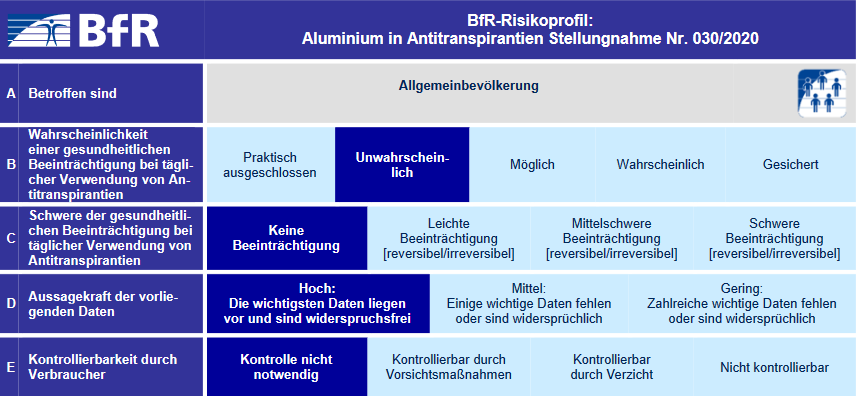risk assessment aluminum
Aluminum salts are an important active ingredient in antiperspirants, as they temporarily block the sweat pores so that sweating in the underarm area in particular can be treated effectively. In addition, the salts have an antibacterial effect, so that the bacteria that normally break down sweat are prevented from taking hold, thus reducing perspiration odor.
The German Federal Institute for Risk Assessment (BfR) has been investigating for years whether antiperspirants containing aluminum increase the risk of serious diseases such as Alzheimer's or breast cancer. To date, the data available on this issue have been heterogeneous and of little informative value.
New studies on aluminum-containing antiperspirants have now led to the conclusion that adverse health effects from aluminum absorption via the skin are unlikely.
The BfR concludes that consumers absorb significantly less aluminum than originally estimated (in the BfR risk assessment of 2014). Adverse health effects from the regular use of antiperspirants containing ACH are unlikely according to current scientific knowledge. However, when assessing the risk of aluminum, it is fundamentally important to consider the total intake via the various entry pathways such as food or aluminum-containing food contact products. However, the contribution of aluminum-containing antiperspirants to total aluminum exposure is much lower than previously assumed.
Taking into account a new study on the absorption of aluminum via the skin, the aluminum intake from antiperspirants is much lower than previously assumed. The contribution of this intake source to the total aluminum intake is consequently very low.

health impairments unlikely
Antiperspirants with aluminum chlorohydrate can be used daily, a health risk for consumers is unlikely according to current scientific knowledge. This is the result of the risk assessment of the BfR based on a new human study (2019) on aluminum intake by antiperspirants (FAQ of the BfR v. 20.07.20). According to current knowledge, the development of breast cancer through the use of aluminum-containing antiperspirants is considered unlikely.
Quellen: FAQ des BfR vom 20. Juli 2020; Presseinformation 24/2020, 20.07.2020 BfR
